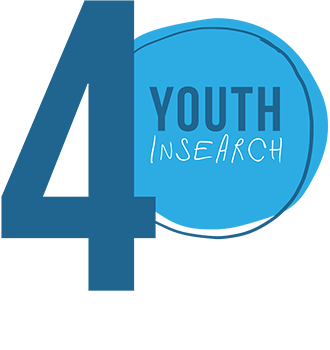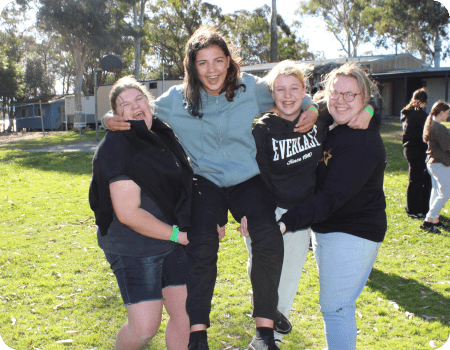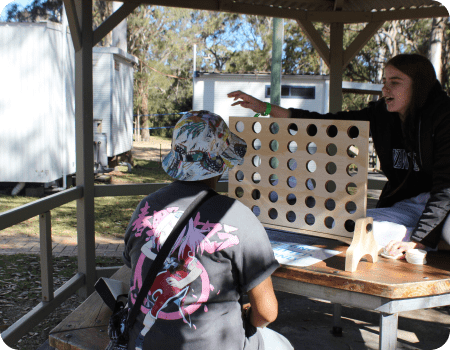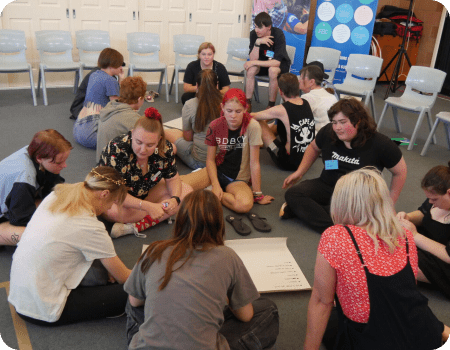The need for this program
Suicide is the leading cause of death for young people aged 12-25 in Australia. Many young people in Australia today are impacted by financial distress, dysfunctional homes, domestic violence, sexual, physical and emotional abuse, death and grief, and other traumatic events.
Trauma and life's challenges can impact a young persons education, employment, homelessness and mental ill health, and may lead to self-harm, suicide ideation, drug and alcohol abuse, crime, and violence. This has the potential to impact these young people long term and into the next generation.
There is a well-established need for mental health and education programs that intervene early and assist at risk young people to improve their lives.
The Solution
The Youth Insearch solution has come from the young people themselves who, with the founder, devised the program in 1985. These young people identified their need to:
- Have the opportunity to talk about their issues and concerns in a truly caring and trusting environment
- Be listened to and affirmed by their peers, thereby getting a sense that they are not alone (a crucial step for those with suicide ideation)
- Have the opportunity to gain insights into their own lives by listening to the experiences of others
- Be part of the solution, empowering themselves to solve their own problems into the future
-
The Youth Insearch program is an award-winning, evidence-based early intervention initiative designed to support at-risk young people aged 12-25. Developed over time, it encompasses mentoring, and empowerment, delivered through weekend workshops, support groups, and individual care.
Our Weekend Workshops and Weekly Support Groups provide young people with opportunities to connect and develop essential life skills. These workshops serve as safe spaces where participants can openly discuss their challenges and receive guidance from trained youth Leaders, peer workers, and social workers.
Our approach involves wrap-around support, ensuring each young person is connected with a local social worker or peer worker, along with a network of peers and trained youth leaders. They also have access to local services, workshops, and leadership training opportunities. We are dedicated to fostering meaningful connections and empowering young people to overcome the obstacles in their lives.
-
Youth Insearch has adopted a focused Place-Based Model (PBM), placing qualified Social Workers and Youth Workers in communities across New South Wales, Victoria, and Queensland. Our goal is to integrate peer-to-peer support and provide safe spaces for young people to heal and thrive.
Why Young People Come to Us:
Our research indicates that up to 90% of participants have experienced complex trauma. As a result, many present with emotional distress and suicidal thoughts, leading to challenges such as substance misuse and disengagement from education.Our Approach:
We believe recovery is relational. Young people benefit from the insights and support of peers with lived experience, fostering validation and connection. This process is complemented by individual support and open dialogue facilitated by Social Workers and Peer Workers.Core Values:
-
Lived Experience sits at the centre of every aspect of our program. Our peer workers and Leaders engage with young people through shared experiences. Through this process, trust is built rapidly as stories are reframed to include messages of hope and recovery.
-
Our person-centred and network-oriented approach focusses on having conversation that is open, raw and real. Through the purposeful and skilled sharing of lived experience, we break down barriers so young people feel understood and supported.
-
Our programs value people and connection. Instead of seeing problems as something wrong with a person, we see it as a response to their situation. We use shared experiences and strong connections to help young people feel hopeful and supported. We value our relationships with each other and our environment.
-
Our programs focus on empowering young people and their networks to overcome their challenges, and to inspire young people to believe in themselves and make positive changes
By providing a supportive environment, we aim to break negative cycles and nurture future Leaders in the community. For more information, please explore our services and eligibility criteria.
-
-
34% of young people who attend the Youth Insearch program are Aboriginal and Torres Strait Islander (ATSI), and 35% are Culturally and Linguistically Diverse (CALD). Our Youth Leaders are from these diverse cultural backgrounds and are all trained in cultural sensitivity.
Many young people enter the Youth Insearch program with significant challenges. Independent reviews have confirmed:
"Multiple and diverse risks factors, and a high incidence of multiple at risk indicators, among the young people in the program”. This included a high prevalence of: broken and dysfunctional families, drug and alcohol abuse, trouble with police and crime, self-harm and suicide, struggles with education, and low self-esteem” (Urbis: 2003: pg.12 & pp.65-66).
“The majority have experienced, or are experiencing, problems stemming from broken and dysfunctional homes, sexual and physical abuse, drugs & alcohol, grief and other traumatic events” (Urbis: 2008: pg.6).
“There is a relatively high prevalence of drug and alcohol use and of a perpetration of violent behaviour and crime among young people attending the [program]” (Urbis: 2008: pg.8).
Further detail on the profile of the participants can be found in our recent internal statistics and findings of the independent reviews.
-
Youth Insearch's hope for the future is that all young people have a safe space to heal and thrive.
We believe that young people with lived experience are best placed to support other young people experiencing mental ill health and life challenges.
-
Youth Insearch provides a program in partnership with primary service providers, which deepens the work these service providers do with their young people, and provides a means for real change to occur.
The program provides environments (such as the weekend workshops, support groups and positive peer support networks) where young people feel able to address the issues in their life that they may have been avoiding. Referring services find this particularly beneficial for resistant young people and those with deep trauma.
Examples of services that refer to the Youth Insearch program include:
- Relationships Australia
- Department of Education (schools, TAFE, etc.)
- Department of Family and Community Services
- Department of Juvenile Justice
- Police, Judges and Magistrates
- Youth Refuges and Shelters
- Youth and Social Workers
- Counsellors and Psychologists
- Community Centres
- Youth Services
- Out of Home Care Agencies
- PCYC
- Life Without Barriers
- Anglicare
- headspace
- Pathways
- Wesley Mission
Youth Insearch is able to accept referrals through other means (such as parents). To make a referral please follow one of these links:
-
Youth Insearch primarily serves at-risk young people between the ages of 12 and 25. These individuals are typically navigating a range of complex challenges, such as:
- Parent and adolescent relationship issues
- Family conflict, dysfunction or separation
- Neglect
- Homelessness
- Domestic violence
- Drug and alcohol abuse and addiction
- Sexual, physical or emotional abuse
- Grief and loss
- Self-harm or suicidal ideation
- Bullying
- Gender and sexual identity
- Low self-esteem
Recognising that at-risk young people have diverse needs and multiple challenges, the Youth Insearch program takes a holistic approach, with a focus on strengths and well-being.
Although the principal target group is at risk young people, any young person may attend the program to increase their self-awareness, self-worth or to help others. In fact, the crossing of experiences is a valuable learning tool for all participants.
Youth Insearch is often successful for young people that have failed to improve through other programs or counselling.
Note: Youth Insearch does not accept young people who require detox if it is dangerous for them to go a weekend without drugs or alcohol, or young people in an acute episode of mental illness until they are stable.




